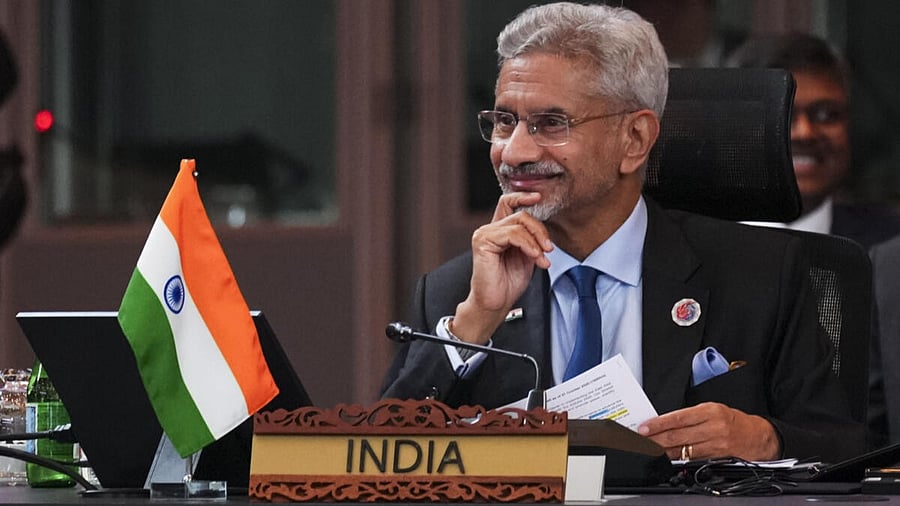
External Affairs Minister S. Jaishankar at the 20th East Asia Summit, in Kuala Lumpur, Malaysia.
Credit: X/@DrSJaishankar via PTI Photo
New Delhi: Principles are selectively applied, and what is preached is not necessarily practised, External Affairs Minister S Jaishankar said in Kuala Lumpur on Monday, tacitly taking a dig at the United States and the rest of the West for accusing India of funding the war in Ukraine and pressing it to stop buying oil from Russia.
He also subtly hit out at the US and European Union’s sanctions on Russia and Iran, noting that the constrictions on energy trade were resulting in market distortions.
Jaishankar, who had a meeting with United States Secretary of State Marco Rubio earlier in the day, said at the East Asia Summit in the capital of Malaysia later in the day that the world should have zero tolerance against terrorism, and the right of the nations to defend against terrorism could never be compromised.
His comment came even as New Delhi’s relations with Washington, DC, came under stress over the past few months, not only due to President Donald Trump’s tariff tirade and his diatribe against India for buying oil from Russia, but also because of his growing bonhomie with the civil and military leadership of Pakistan.
His administration’s praise for the counterterrorism efforts of Pakistan in complete disregard of India’s concerns over cross-border terror, particularly after April 22 terrorist attacks in Jammu and Kashmir, as well his repeated claims about persuading the two South Asian nations to end the four-day long military flare-up on May 10 further raised the tensions.
“Appreciated the discussion on our bilateral ties as well as regional and global issues,” Jaishankar posted on X after meeting Rubio on the sidelines of the East Asia Summit in Kuala Lumpur on Monday. Neither he nor the Ministry of External Affairs in New Delhi elaborated further details of the meeting. The US State Department also did not make public what was discussed during the meeting.
Rubio had said on Saturday that the US was keen to expand its ties with Pakistan beyond counterterrorism cooperation, but not “at the expense of or instead of” a good relationship with India. Trump, himself, too, had reiterated on Saturday that India would cut down on oil imports from Russia completely.
“We meet in complicated times. There are growing concerns about the reliability of supply chains and access to markets. Technology advancement has become very competitive, and the quest for natural resources even more so,” said Jaishankar, presenting India’s national statement at the East Asia Summit in Kuala Lumpur. “Energy trade is increasingly constricted, with resulting market distortions. Principles are applied selectively, and what is preached is not necessarily practised.”
Trump had announced on August 6 an additional 25 per cent tariff – on top of 25 per cent levied earlier – on India’s exports to the US, in order to dissuade the South Asian nation from buying oil from Russia. He and his aides often accused India of helping President Vladimir Putin to continue the war in Ukraine by buying oil from the former Soviet Union nation, defying sanctions imposed by the US and European Union.
Russia’s share in India’s total crude oil imports rose from less than 2 per cent before the launch of its war in Ukraine in 2022 to around 40 per cent by 2023–24.
But, in recent months, Russia’s share had slipped to about 36 per cent of total oil imports of India.
India had pointed out that the US, itself, had continued to import from Russia uranium hexafluoride for its nuclear industry, palladium for its Electric Vehicle industry, fertilisers, as well as chemicals. The Ministry of External Affairs in New Delhi had pointed out that the US had initially actively encouraged imports by India from Russia “for strengthening global energy market stability”.
The EU also targeted entities in India with sanctions for helping Russia sell its oil. New Delhi, however, pointed out that Europe had a €67.5 billion trade with Russia in 2024, and the trade included not just energy, but also fertilisers, mining products, chemicals, iron and steel and machinery and transport equipment.
“Terrorism poses a continuous and corrosive threat. The world must display zero tolerance; there is no room for ambivalence. Our right of defence against terrorism can never be compromised,” Jaishankar said on Monday.
Trump had last month hosted Pakistan's Prime Minister Shehbaz Sharif, who lauded him for "facilitating" the May 10 ceasefire that ended a four-day cross-border military flare-up between the South Asian nation and its arch-rival India. Sharif was accompanied by Field Marshal Syed Asim Munir, the chief of the Pakistan Army, during his meeting with the US president at the White House.
Trump had earlier hosted Munir at his official residence in Washington, DC, on June 18, completely disregarding New Delhi’s allegation that the Pakistan Army chief had provoked the April 22 terrorist attack near Pahalgam in J&K with an incendiary speech against India.
